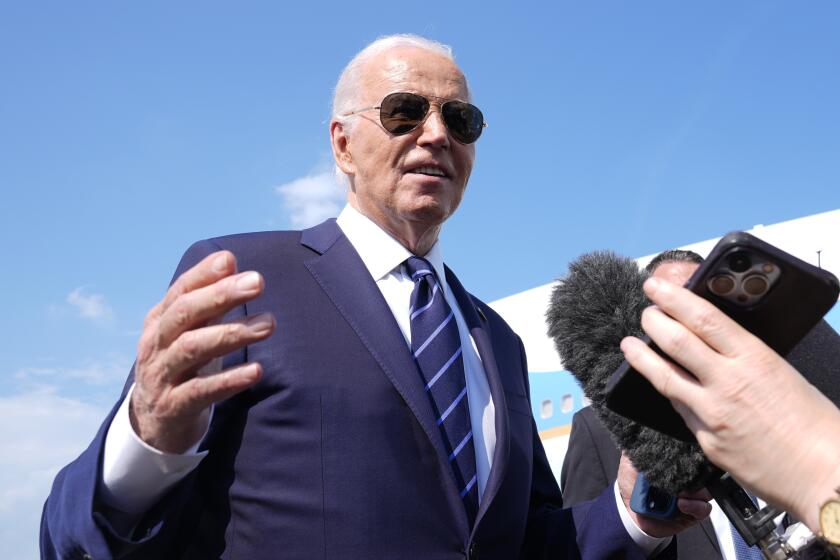EU Struggles to Find Common Ground
Leaders of a Europe in turmoil opened two days of talks here Thursday, awash in bitter disputes over money and politics that threaten the future of the continent’s 25-nation alliance.
The European Union, established decades ago to bring peace and stability to a land emerging from world war, is struggling to come to terms with a new reality after a jarring revolt by voters, economic malaise, mounting bureaucratic inefficiency and public fears of overly swift expansion.
Europe “is at a crossroads,” said Jose Manuel Barroso, president of the executive European Commission. Failure to recover momentum “will plunge the EU into permanent crisis and paralysis,” he warned.
The summit was intended to show that the EU was unified and moving on after its hallmark constitution was torpedoed recently by voters in France and the Netherlands.
Instead, negotiations on the alliance’s budget for the next seven years were at a stalemate Thursday, with the region’s biggest economies unable to agree over issues such as farm subsidies. And calls to shelve the constitution were growing.
“This is one of the most difficult summits we have ever had,” said Luxembourg Foreign Minister Jean Asselborn, whose nation holds the EU’s rotating presidency and is chairing the summit.
The mood was subdued Thursday afternoon as heads of state and government and foreign ministers from EU states, along with key alliance officials, came together in a modern, somewhat drab building named for a 16th century Belgian philosopher who studied Stoicism.
Many leaders appeared resigned to having to abandon some of the fundamental tenets and tools that not so long ago united them in a formidable alliance.
In addition to the stillborn constitution and the endangered $120-billion-a-year budget, casualties could include the EU’s most important foreign policy device: expansion and the offer of membership.
“If you look at the short term, you’d be tempted to say the European Union is dead,” said Federiga Bindi, director of the European Office for Rome’s University Tor Vergata.
Bindi and other analysts noted, however, that the EU has weathered severe crises before and managed to survive. They predicted that it would again stagger through; rather than collapse, the EU is more likely to be entering a period of stagnation that further undermines its ability to muster clout and influence world events.
Leaders here will be looking beyond the agenda of the two-day summit and reassessing the very political identity of the bloc and its core philosophy.
Member states are divided roughly into two factions: those, such as France and Germany, that favor a strongly integrated union with social protections and careful economic planning; and others, such as Britain, that favor a more loosely connected, expanding alliance with free-market reform and less regulation.
The latter group is also more friendly to Washington.
Some analysts predicted that economic and political tensions could continue to pull at the two factions, with a gradual unraveling of the alliance -- but not a sudden and catastrophic breakdown.
Analysts throughout Europe say the EU will have to redefine itself to generate new dynamism and avoid being cast adrift. With the Cold War or similar threats no longer uniting the continent, the union must find a new mission that resonates with an unhappy public.
“Europeans are in psychological disarray, because they do not see a direction, and they do not see a direction because they don’t see leadership,” said Ana Palacio, the former foreign minister of Spain and head of the Spanish parliamentary committee on Europe. Leaders will have to devise a new vision, she said in a telephone interview from Madrid, that addresses serious internal structural problems instead of catering to superficial fears.
If Europeans do see a common threat, it’s in a globalized economy with countries such as China and India that are quickly out-pacing and out-competing the continent’s sluggish national economies, which are saddled with high unemployment and expensive welfare systems.
Case in point: Several shoe manufacturers, especially in Italy and Spain, are protesting what they say is the unfair flooding of the European market by cheaply made Chinese shoes at lower-than-cost prices. The dispute has become a major trade row, with the EU launching a probe into possible dumping and threatening to impose fines on China.
The setbacks that have hit the EU in recent weeks reflect a resurgence in national interests over regional unity.
Moreover, EU leaders are paying the price for having failed to consult their publics on most of the important decisions of the last decade of European integration.
“I think it’s about reconnecting. The gulf is huge between what the EU does on a day-to-day basis and people’s understanding of it,” said Alasdair Murray, deputy director of the London-based Center for European Reform. “People do not feel part of it.”
The constitution dominated Thursday’s summit talks, while today will be dedicated to the budget battle.
Barroso, the European Commission president, called for a “pause for reflection” in the long-fought campaign to ratify the constitution, a key charter intended to better unify the bloc, consolidate its power and international influence and streamline its decision-making machinery.
The document was already on shaky ground after it was rejected by voters in France late last month and the Netherlands early this month, and after Britain decided to postpone its vote. But Barroso was the most senior EU official to recognize the reality, and his comments carried added weight.
His call was fast gaining steam Thursday. Danish Prime Minister Anders Fogh Rasmussen hinted that Denmark would also freeze plans to hold a referendum on the constitution.
“We cannot continue as if nothing has happened,” Fogh Rasmussen told reporters at the margins of the summit. “We can’t put the treaty to a vote in Denmark if there’s no treaty to vote on.”
However, several smaller countries, including Slovenia and Malta, were advocating trying to resuscitate the charter.
The EU’s financial troubles were proving to be as problematic as the constitution. Luxembourg Prime Minister Jean-Claude Juncker said he was pessimistic a deal would be reached on the 2007-2013 budget, especially because of sharp disagreement between France and Britain.
British Prime Minister Tony Blair said he would not consider returning any of the $6-billion rebate his country receives from the EU budget unless farm subsidies, which greatly benefit France, were overhauled. French President Jacques Chirac said the subsidies, which consume nearly half of the EU budget, were off-limits.
The British have threatened to veto the budget over the question of the rebate, which was designed two decades ago when their country was poorer but is now seen by many in the EU as unnecessary and unfair. Juncker is pursuing a compromise in the fight.
With its main political document, the constitution, and the budget both apparently in tatters, the EU is reportedly drafting a closing statement that will for the first time in many years not mention enlargement.
“To my mind, we must reduce the speed of enlargement,” EU External Relations Commissioner Benita Ferrero-Waldner told reporters ahead of the summit.
This is of particular concern to Turkey, a largely Muslim country of nearly 70 million people that is scheduled to begin talks to join the EU in October.
The rejection of the constitution by France and the Netherlands was interpreted at least partially as a complaint that the EU was expanding too quickly, that its geographic boundaries were making less and less sense and opening the door to a flood of immigrant workers.
Ten mostly eastern countries were added to the EU in May 2004, and two of Europe’s poorest nations, Bulgaria and Romania, are scheduled to be admitted in a couple of years.
But if the EU can no longer dangle the carrot of membership to aspiring nations, it will be deprived of its most important foreign-policy tool and lose most of its ability to influence the behavior of other societies, analysts said.
For example, the Turkish government has made significant improvements in human rights, in reining in the military and in recognizing minority cultures, all in hopes of joining the EU.
“The attraction of EU membership has been extremely successful and is the only really effective tool that it has,” Murray of the Center for European Reform said of the alliance. “You lose that, you lose your leverage.”
Palacio, the Spanish parliament member, said she remained optimistic that the EU would survive.
“Europe is on a bumpy road,” she said, “but let’s not forget that Europe is a success story.”
Asselborn, the Luxembourg foreign minister, was more pessimistic.
Failure to make decisions at the summit, he said, “will send a bad message to the public that Europe does not work.”
More to Read
Start your day right
Sign up for Essential California for news, features and recommendations from the L.A. Times and beyond in your inbox six days a week.
You may occasionally receive promotional content from the Los Angeles Times.







